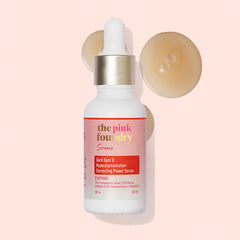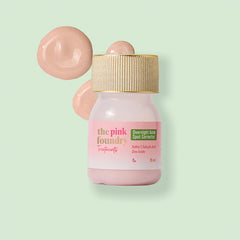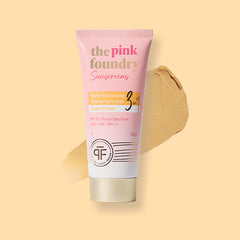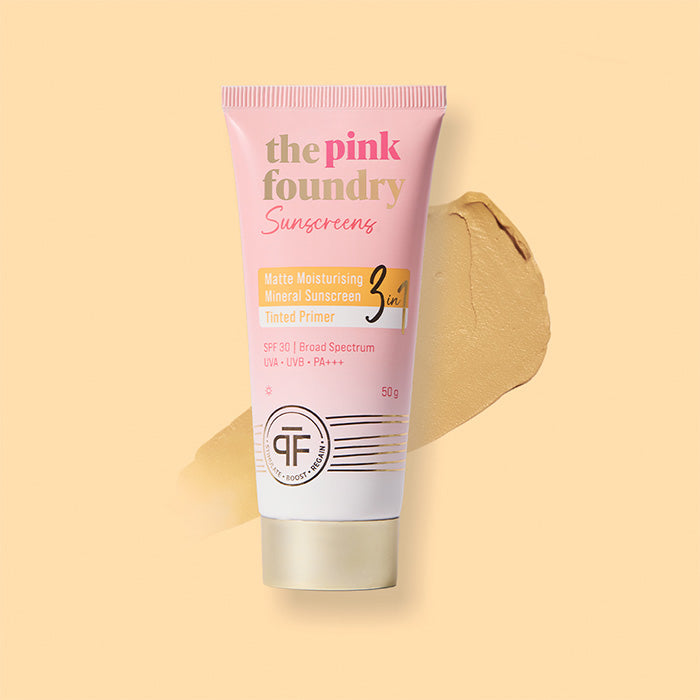Which Sunscreen Is Best For Dry Skin In India
Like other beauty essentials like night elixirs or moisturisers, sunscreen does not come in one size fits all. Though many of us believe that the only item to consider when purchasing a new tube of sunscreen is the SPF information, this is not the situation. Sunscreens, like skincare items, must properly fit a person's skin. In reality, numerous sorts are available for different skin types. With every fresh discovery, more and more options are available to meet the needs.
Which Is The Best Sunscreen For Dry Skin In India?
The Mineral Matte Tinted Sunscreen from Pink Foundry best suits dry skin. It has Zinc oxide, an organic substance that gives broad-spectrum UVA and UVB protection. Titanium Dioxide is a physical sun blocker that reflects sunlight away from the skin.
The cucumber essence is a herbal antioxidant that aids skin soothing and protection. Shea butter is a nutritious, rich substance that hydrates and moisturises the skin, which is the best for dry skin. On top of that, this sunscreen provides SPF 30 protection which is suitable for the Indian skin tone.
How To Choose Sunscreen For Dry Skin?
One in every five people will acquire skin cancer over their lifetime, based on the American Academy of Dermatology. Intermittent exposure to sunlight during adolescence and childhood may bring the chance of developing skin cancer. Even one severe sunburn as a child can almost double a person's risk of acquiring cancer later in life. These are just a few reasons why regular sunscreen and sun protection are critical for preventing skin cancer and premature skin ageing.
Sunscreen may also have another function: skin hydration. Moisturisers with SPF offer the additional advantage of moisturising dry skin while protecting it from the sun.
What To Look For In A Dry Skin Sunscreen?
1. Sun protection that is adequate:
Seek sunscreens that offer "broad-spectrum" protection from UVB and UVA radiation. Mineral sunscreens, also known as physical sunscreens, include chemicals such as zinc oxide & titanium dioxide, which are necessary for UVA and UVB sun radiation protection.
SPF, or sun protecting factor, is a crucial component to consider. SPF measures the amount of UV rays a sunscreen can block. Dermatologists currently recommend an SPF of no less than 30. An SPF of 30 prevents 97% of UVB rays from the sun.
A higher SPF will not safeguard you for a longer time but rather provide more coverage. Having said that, no sunblock can truly prevent the sun's UVB radiation entirely.
2. It All Comes Down to the Ingredients:
Finding a sunblock that defends the skin and hydrates it can be difficult for individuals who suffer from dry skin. Sunblocks containing the following chemicals increase skin hydration by enhancing the suppleness and cohesiveness of the skin barrier.
- Glycerin: Glycerin is a moisturising chemical known as a humectant, which means it draws moisture back into your skin and inhibits additional water loss.
- Ceramide: Ceramide is an important element in preserving the skin layer and limiting water loss in the skin. Ceramides are lipids in the skin's outermost layer, often known as the epidermis.
- Niacinamide: Niacinamide is a powerful moisturiser that promotes the development of important proteins in the skin and lipids. These lipids and proteins are critical because they are typically compromised in people with dry skin and eczema.
- Shea butter: Shea butter, obtained from the Shea tree's fruit, offers soothing and moisturising properties.
3. Avoid Typical Skin Irritants:
Contact with the following compounds, which may cause skin rashes or irritation, may aggravate skin dryness:
- Fragrance: While fragrance may be enticing while shopping for sunscreen, it is a common allergy and may aggravate dry skin.
- Botanical or "plant-derived" substances: Despite the label "all-natural," some botanical compounds may aggravate and irritate dry skin and cause rashes and redness.
Which Type Of Sunscreen Is Best For Dry Skin?
There are various varieties of sunscreen, so how can you know which one is best for you? This answer is dependent on various aspects. There are Cream-Based Sunscreens and Gel-Based Sunscreens. It would be best if you choose according to your skin preference. So, shall we begin?
1. Gel-based sunscreen:
Gel-based sun protection is sunscreen formulations that take the form of a gel. They are intended to offer sun protection while being lightweight and non-oily on the skin. Here are some important things to know regarding gel-based sunscreens:
· Sunscreen Protection:
Like other sunblock varieties, gel-based sunscreen products are designed to shield your skin from the harsh effects of UV rays from the sun. They function by either reflecting or absorbing UV rays, stopping them from penetrating and damaging the skin.
· Sensation of Cooling and Refreshment:
Many gel-based sunscreens are refreshing and cooling to the skin. The water-based solution and lightweight texture offer a calming sensation to your skin, making them especially ideal for hot and humid conditions.
Individuals with greasy or acne-prone skin should use gel-based sunscreens. The non-greasy consistency is less inclined to build up in pores or trigger outbreaks. That's why it's the best fit for acne-prone skin.
2. Cream-based sunscreen:
Cream-based sun protection is a sunblock composition that arrives as a cream formation. Their main purpose is to provide sun protection and moisture to the skin simultaneously. Here are some important factors to know about cream-based sunscreens:
· Sunscreen Protection:
Cream-based sunblock protects the skin from harmful UVA and UVB rays like other sunblock varieties.
· Moisturising Properties:
One of the benefits of cream-based sun protection is that they moisturise. The thick texture helps to trap moisture, which makes them ideal for anyone with dry skin. The additional hydration can improve the overall appearance of the skin and assist in avoiding dryness or flakes.
· Ideal for Dry Skin:
Cream-based sunscreen products are frequently advised for people with dry skin. The creamier texture adds another layer of nourishment and can help relieve sensitive or dry skin.
Also Read: Best Sunscreen For All Skin Types And How To Choose One As Per Your Skin Type
Which SPF Sunscreen Is Best For Dry Skin?
The SPF label indicates that a product prevents and absorbs UVB rays, which cause sunburn and skin carcinoma. The American Academy of Dermatology suggests applying sunscreen with a sunblock factor of at least 30 for dry skin, which protects 97% of UVB rays from the sun.
The Pink Foundry's Mineral Matte Tinted Sunscreen can be a good choice in this regard.
Conclusion:
Long periods of exposure to the sun make your skin sensitive. Whether you're on holiday to the coast or working outside, using sunscreen to safeguard your skin is critical. UV radiation can cause sunburn, lines and wrinkles, and other medical issues.















